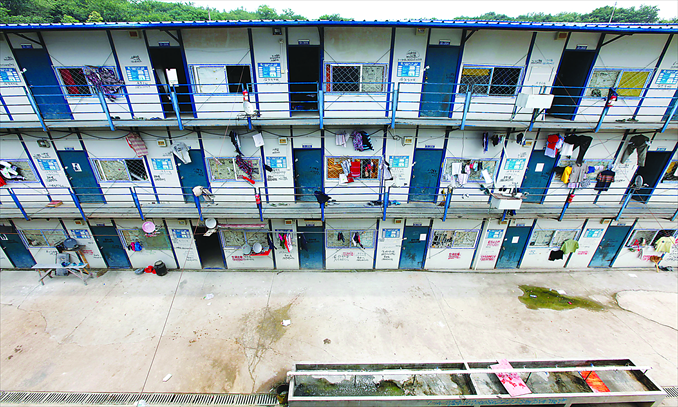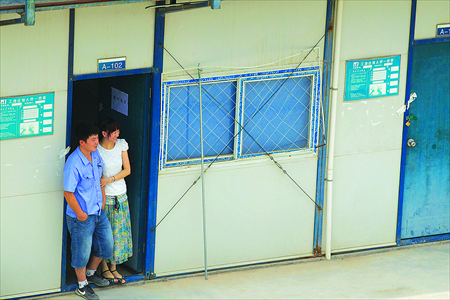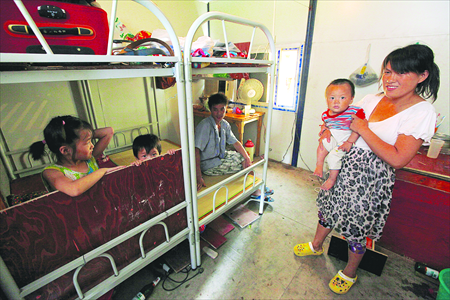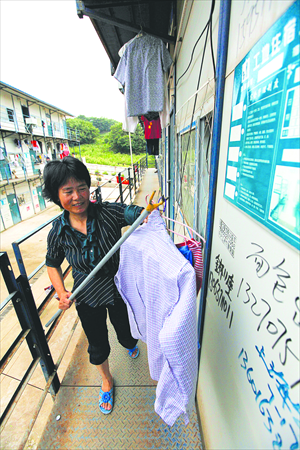Conjugal rights at building sites

Rough hands and torn clothes soaked with sweat, these traditional images of construction workers have lasted for decades in China. Migrant workers, have often been looked down upon as belonging to a lower social stratum and are often blamed for rising urban crime rates and a demographic explosion.
Nevertheless, more and more cities have begun to pay attention to migrant workers' needs. A construction site in Nanjing, capital of Jiangsu Province, shows respect and provides guarantees to them, allowing for a better work environment.
It has built more than a hundred prefabricated double rooms on site for workers to live with their spouses, rather than crowding together in a dormitory.
The Nanjing Daishan low-income housing construction site, the largest such project nationwide, now holds more than 20,000 migrant workers. After completion, it will accommodate 100,000 residents.
"Many male workers have got married, the construction company needs to take their emotional and sexual needs into consideration," said Yang Shun, the chief engineer of Nantong No.2 Construction Group of Jiangsu Province, one of the contractors of the project.
The double rooms account for more than 10 percent of the total dormitories on site, not to mention those for other companies, he added. "Our company built more than 360 dorms on the site, 100 of which are prepared for couples. This number can meet all the needs of our married workers," Yang added.
According to a report on the sexual life of migrant workers, among 800 respondents, 51.2 percent have been approached by prostitutes and 15.82 percent have had sexual relations with them.
The research, which was completed by Zhang Wenwei, deputy director of Shaoxing Health Bureau in Zhejiang Province, was published in the Chinese Journal of Human Sexuality in 2007. It showed that 25.53 percent of the interviewees had had extra-marital affairs.
In a 2008 survey into the sexual health of migrant workers in Guangdong Province, it was found that among workers renting apartments outside their construction site, a mere 5 percent were married, while 35 percent were cohabiting with their partners.
The double rooms could greatly help relieve male migrant workers' sexual frustration, according to Shang Xuejun, a doctor of andrology at the General Hospital of Nanjing Military Command. "A regular sex life with one's spouse is beneficial to a couple's physical and psychological well-being. It also helps largely lower the crime rate and unstable factors in society," he added.

A young couple look out from their joint dorm room in Nanjing. Photo: Lu Yun/GT
Love nest
"Before moving into the conjugal room, I was far away from my wife, sometimes when I felt extremely lonely, I went out looking for fun," said Zhang Fajin, 34.
He told the Global Times that he had strayed from the nest in the past. "I need to live with my wife, though this room is not gorgeous, it's our home anyway. It is quite warm and cozy," Zhang added.
"Such rooms contribute to a harmonious environment. People used to pour scorn on construction workers but this pilot program is showing that these outdated clichés have changed," Zhang Yiyun, who holds a doctorate in psychology, told the Global Times.
The 10-square-meter rooms are simple but have modern conveniences. With a double bed taking up one-third of the room, a simple wardrobe and a television are neatly arranged in the corners, while an air conditioner fights against sweltering weather.
Zhang Fajin was watching the London Olympic Games on TV with his wife Su Xiaocui during their afternoon break. Since the construction company opened the conjugal rooms for married couples last year, Su moved from the suburbs of Nanjing to be with her husband.
She used to meet her husband once a month and spent the rest of her time taking care of her parents. "My husband had to live with other workers on the construction site before; it was hard for us to be together every day, though both of us knew it was not good for our marriage," she said. One of Su's friends decided to divorce her husband, a sailor, after two years of marriage due to being separated for too long. "This is an example and warning to us, we don't want the same thing to happen to us," she added.
Applying for a conjugal room is not difficult. With a marriage certificate and an ID card, construction workers can obtain one with their spouse.
"Migrant workers used to be considered as tools in urban planning, but with this pilot, they are having their own personal needs catered to," explained Zhang Yijun.

A family of five from Fuyang, Anhui Province, rest from the sweltering noon in a dorm. Due to being the violation of the family planning policy, the parents refused to give their names. Photo: Lu Yun/GT
Birth of a new concept
In 2007, a hotel in Guangdong Province offered rooms at 10 yuan a night for migrant workers and their spouses. But to Tao, 46, and his wife, this seemed like a waste of money.
They lived with five other couples in one room on a construction site in Guangdong. Several pieces of cloth split the room into six small areas with beds. "We used to feel embarrassed and depressed when we had sex at night, and used a quilt to cover the sound. But everyone could still hear us," Tao told Hong Kong-based Phoenix TV.
Another room had 18 beds housing couples and single male workers.
"We often waited until midnight when the else went asleep. Sometimes single workers would tell us to keep it down," Tao added.
The Nanjing construction site seeks to set a new example. "China's construction industry has been developing and expanding considerably in recent years as a labor intensive industry. We are in great need of workers. We are doing our best to keep them," said Yang Shun.
Each dormitory on construction sites usually accommodates five to six workers, but when workers' families came to visit, it became impossible for so many people to live together. "At that time, workers began to build temporary apartments with wooden boards. These were quite dangerous. Once a drunk worker fell off a temporarily built shelter when going to the bathroom during the night," said Tan Weijia, head of the supervision department for Nanjing's construction safety bureau.
Later, workers tried to turn their dormitories into separate areas with thin clapboards, but it was still hard to maintain their privacy. "Considering their needs, the local government and Nantong No. 2 Construction Group decided to turn the Daishan project into a pilot program for double rooms. If it works, we will promote this across the city," Tan told the Global Times.
Watching kids frolicking and chasing each other on the concrete ground outside, Su and her husband admitted that they may try to have a baby soon. "We have been married four years but didn't spend much time together before, so there was little chance to get pregnant. But now, everything seems ready," said Su.
"After this project is completed, we hope other construction sites can also offer us such facilities," she added.

Shan Meinian, 42, from Chuzhou, Anhui, is collecting laundry outside the dorm she shares with her husband. Photo: Lu Yun/GT
Teething problems
"The policy seems great according to the current response, but we have concerns in extending it citywide," said Tan Weijia.
"Most construction workers frequently move from one site to another. For example, a brick layer only stays at a project site for two to three months," Tan added.
Double rooms also mean extra costs for construction firms. The prefabricated room cost more than 300 yuan per square meter, but double rooms decrease the numbers of workers housed. Room space is also limited by the actual area of the construction site. If a project is located in a downtown area or a densely-populated community, it is not easy to build many conjugal rooms.
When contracting public construction projects, the local Nanjing authority has given priority to companies who can offer such rooms to married workers, and is promoting this as a preferential policy, according to Tan.
The local government and construction companies are trying to manage builders in a more humane way, and offer them better living and working conditions in other ways. For example, to avoid high temperatures in summer, work lasts from 6 to 10 am and 3 to 6 pm. "We often go to the site to supervise whether the company is implementing the policy properly," he added.
According to the National Bureau of Statistics, the total number of migrant workers reached 252.78 million in 2011, 4.4 percent up on last year. Among them, 158.63 million chose to work outside their home, marking a 3.4 percent increase.
Considering the huge number of workers, a modest expenditure could go a long way toward making workers happier, according to psychologist Zhang Yiyun.
"These conjugal rooms show our respect for the workers, who leave their families behind to work in unfamiliar cities. Living with their spouse allows them a family life and privacy. This will make society as a whole more stable," she added.
However, Gu Xiaoming, a sociology professor with Fudan University, said although the benefits for migrant workers are clear, such pilot projects face many problems. "The construction company can offer better housing to married workers, but what about single ones? Double rooms cost more than all-male dormitories, and the extra cost is bound to be passed on to the customers. The program needs further research."